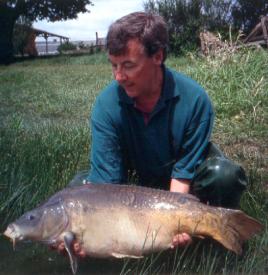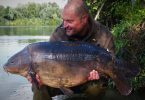The Oxford Dictionary defines ‘ethics’ as a moral philosophy or a set of moral principles. Keeping the rules, in fact…. or is it? Suppose you are fishing a water which requires that all pike be killed – you catch a pike by accident, but instead of killing it, you return it live to the water. By breaking a rule in order to stay true to your principles, have you behaved ethically, or unethically?
Tricky one, that.
BOATS
An ethical issue which crops up from time to time in carp magazines concerns the use of boats. If we assume their use is permitted on a water, is it ethical to use one? And if so, how should it be used?
I will use a boat in order to learn about a water – to go out with an echo-sounder in order to enable the drawing of a detailed water map. I also see nothing wrong in using a boat for swim access – providing it does not disturb other anglers, of course. I’ll use one for putting out free-feed, too. But that is where it ends. I will not use a boat to take out terminal tackles. In many overseas waters, and some UK waters, too, boats are used to enable anglers to fish well beyond casting range – up to three or four hundred yards. Other times a boat might be used not for distance, but to enable terminal tackles to be placed somewhere which would otherwise be inaccessible – deep beneath the branches of a far-bank overhanging willow tree, for example.
 Is the boating-out of terminal tackles legitimate? Is it ethical?
Is the boating-out of terminal tackles legitimate? Is it ethical?
I think not, so I don’t do it. In saying that, I am not trying to take the moral high ground, and I have no intention of preaching to those who feel differently, but to me it seems that step too far. Casting is an athletic skill; if someone wants to fish beyond others, or place baits in difficult-to-access spots, I feel they should try to acquire the necessary skill, not short-circuit the situation by boating-out their terminal rigs.
Doubtless even those who disagree with me can see ‘where I’m coming from’, to quote the clich‚, on that particular issue – but it gets somewhat more complicated. While I will not boat-out terminal rigs when fishing from the bank, I see nothing wrong in using a boat as a fishing platform. I’ve caught loads of pike and trout from boats, and have not suffered the tiniest pinprick of conscience while so doing.
Inconsistent? Yes, I suppose it is. But that’s the trouble with ethical issues, they are not always clear cut.
The foregoing, incidentally, applies to rowing boats and outboard powered boats, but the same principles – other than the ‘fishing platform’ bit – apply to bait-boats.
WEEDS AND SNAGS
Several years ago I was a member of an Essex syndicate. One particular summer, the shallows became heavily weeded. Ninety percent of the carp spent ninety percent of their time on those shallows. Beyond the weed – a cast of about eighty yards, I suppose – was a clear area. If baits were cast to this area, runs were virtually assured. Trouble was, hooked carp had to be pulled through eighty yards of intervening weed where, most times, they became immovably stuck, so anglers were compelled to pull for a break. I would estimate that four out of every five carp hooked were lost, many of which were left trailing hooks and line.

The anglers who fished the shallows were breaking no rules, but was it ethical to fish there? I decided it was not, so I declined to do so – instead I concentrated my efforts up the deeper, semi-weedfree end of the pit which, unfortunately, was often carpless, too!
A friend of mine encountered a similar situation in a Kent club water, only this time the carp were among snags. A small group of anglers cast adjacent to, and sometimes actually in the snags. Predictably, many of the carp which were hooked were lost. The situation was exacerbated at night by the delay which occurred as the anglers woke up, then extricated themselves from sleeping bags and bivvies. They broke no rules, but in my opinion fished in an unethical, not to say irresponsible manner.
Rules can be manipulated – and again ethics come to the fore. As an example, consider the two anglers who decided to concentrate their winter fishing on one of my local pits. The club has a ‘no prebaiting’ rule, which it defines as putting in free-bait other when actually fishing. So what did our two ‘master baiters’ (pun intended!) do? They would arrive at the water, assemble a rod, chuck in a couple of kilos of boilies, then dismantle the rod and leave. Despite being at the water for less than half an hour on such occasions, they claimed that they had not broken the ‘no prebaiting’ rule. In literal terms, that was true – but they had undoubtedly abused the spirit of the rule. As it turned out, their endeavours went to waste because they caught nothing. And doubtless due to the excessive amount of free-bait they put out, precious little was caught by anyone else that winter, either. But their tactical stupidity is not the issue; I question their ethics.
INSTANT BIGGIES
In recent years a lot of big fish have been imported from the Continent and stocked in UK waters. Some of those fish have been imported illegally; others have been brought in legitimately. But let us set aside the legality or otherwise of those importations, and also the serious risk of introducing disease which might affect indigenous fish – instead let us look at the ethical issues which are raised.
‘Instant biggies’, we are told, devalue our home-grown fish. A big Continental ‘stockie’, it is said, is less worthy than a fish which has grown large in the UK. While I can understand the sentiments of the ‘British is best’ contingent, I think they have been hoist by their own petard. For many years they have placed inordinate emphasis on a carp’s size – or to be more precise, its weight. Big fish have become prestigious; an angler’s worth being measured, in large part, by how many big carp he has caught. It was always a superficial measure of merit, but it had the virtue of simplicity. But the issue became confused – big fish were being introduced here, there and everywhere. The shortcomings of the simplistic ‘big is best’ philosophy were suddenly thrown into sharp relief.
My attitude is best summed up by my response to someone who expressed the opinion that ‘imported fish don’t count’.
"Towards what?" I asked.
In other words, what is the significance of a ‘brag list’ of big fish? It demonstrates a high level of competence, certainly – but then again, there are plenty of highly capable anglers who confine their fishing to waters where the carp are smaller, so a list of big fish does not necessarily indica
te that someone is a better angler than the next man. So if not proof of exceptional expertise, what is it? Could it be status? Ah! I think we’ve hit on something! In pre-importation times – a big fish list gave an angler kudos and rank. Unfortunately for the ‘British is best’ purists, the weeklies and their readers rarely distinguish between home-grown fish and imports – a forty pounder is a forty pounder whatever its origins.
So, is it ethical to fish for big imported carp, and then to report them to the angling press without making it clear that they are immigrants?
Frankly, yes. After all, what does it matter?
There is nothing unethical about fishing for imported fish – indeed, I could make a pretty good case for it being considerably more ethical than deliberately setting out to catch a home grown fish which has already been caught far too often.
I don’t fish for newly introduced imported fish, but my reasons have nothing to do with ethics. I fish for personal satisfaction – not for plaudits or kudos. And satisfaction is an intangible quality – it depends on lots of different factors, chief among them being a sense of achievement. What anyone else catches – either in terms of size or the country of origin – is completely irrelevant.
 SWIM HOGGING
SWIM HOGGING
Go to any big-carp water where there are no restrictions on the length of time one can fish, and chances are you will find long-stay carp anglers. Sometimes they will monopolise key swims – or what they perceive to be key swims – for weeks and occasionally months on end. It places unremitting pressure on the fishery – and consequently the fish – and excessive wear-and-tear on their chosen swims. Additionally, it restricts other anglers’ choice by taking certain swims out of commission.
If, as we said, there are no restrictions regarding this sort of thing, then these full-timers are not breaking any rules – but is what they do ethical?
My own fishing is rarely affected by this sort of thing because I’ve usually scuttled away to quiet waters long before the situation arises, so I have no personal axe to grind when I say that I think long-term swim hogging is unethical. It is also extremely selfish, but that is another issue.
TARGET FISH
Earlier I made reference to fish which are caught too frequently. In some waters there are so-called ‘mug fish’ which just keep turning up – short of transferring them to a non-fished water where they can enjoy a peaceful retirement, there is not much we can do about the situation. But what of particular big fish being deliberately targeted – and that despite their having been caught time and time again. One that immediately comes to mind is the big mirror they call ‘She’ which lives in Faversham’s School Pool. How often has that poor carp been caught, I wonder – a hundred and fifty times? Two hundred? More? The hapless ‘She’ is an extreme example, but sadly, by no means unique. Can we honestly justify that sort of thing?
IN CONCLUSION
For the word ‘ethics’ we can sometimes substitute ‘altruism’, ‘fairness’, ‘unselfishness’ or ‘consideration’, but ultimately it is indefinable because what is wholly acceptable to one angler, might be unacceptable to another. So in the absence of an ‘ethics ombudsman’ who, imbued with the wisdom of Solomon, can arbitrate on such matters, we have to decide for ourselves what is ethical, and what isn’t.








